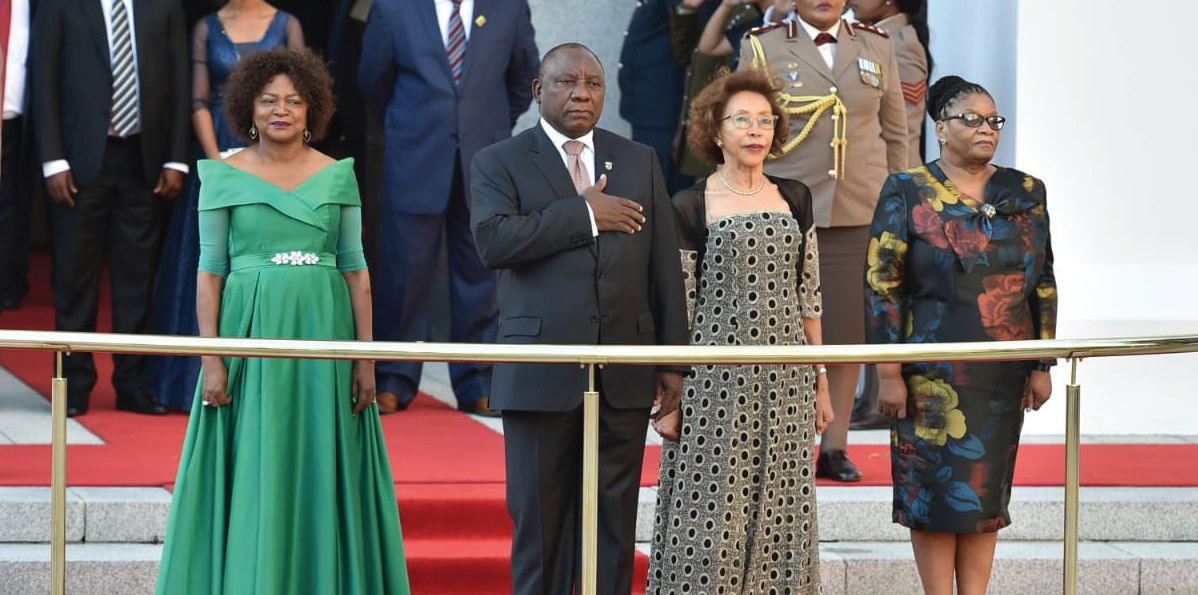Feb 2019 2nd Edition
Feb 2019 2nd Edition Joy
Translations
2019 Elections set for 8 May
2019 Elections set for 8 May angenithaSouth Africans will go to the polls for the sixth general elections on May 8.
The date was announced by President Cyril Ramaphosa during his State of the Nation Address (SONA).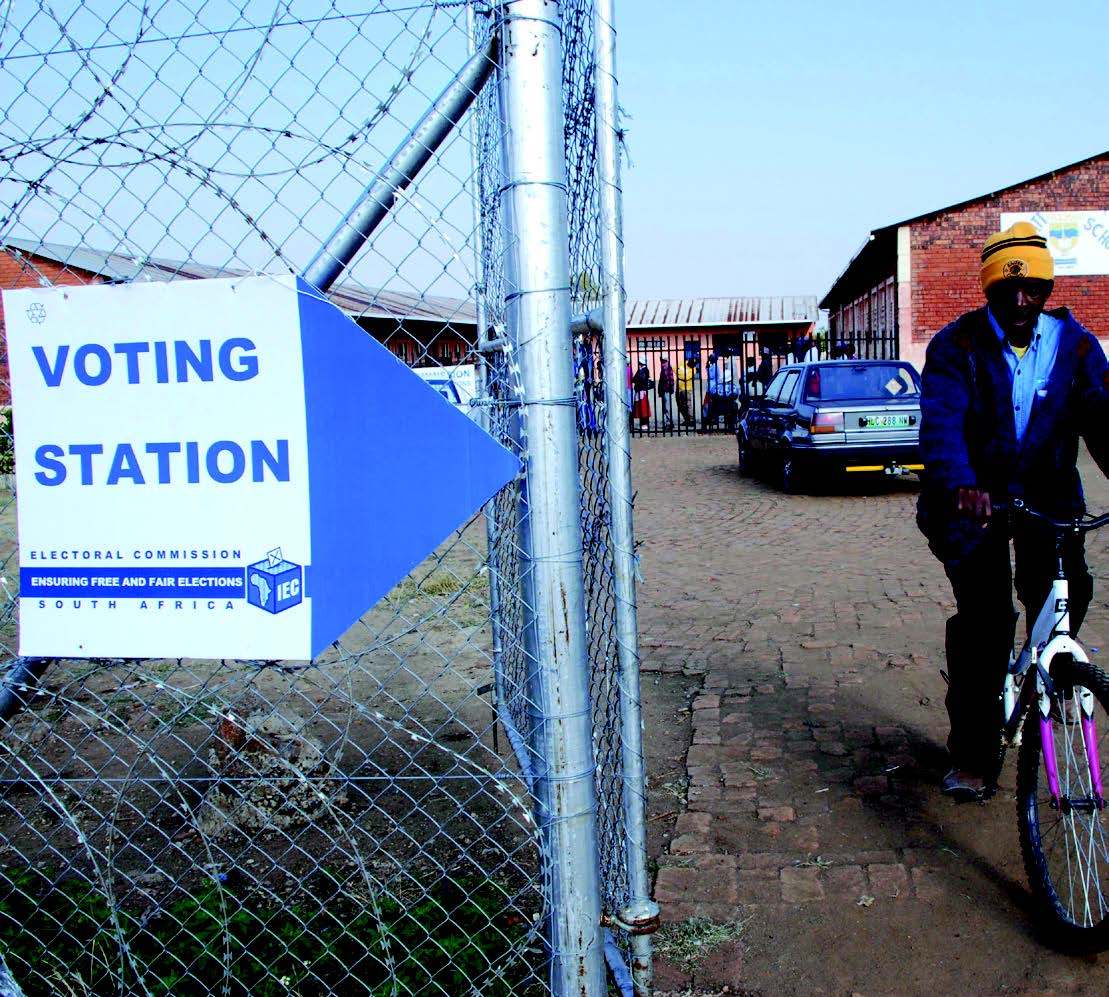
“This is an opportunity for our people to exercise their hard-won right to determine the direction of this country,” the President said in a joint sitting of the two Houses of Parliament.
The President has already met the Independent Electoral Commission (IEC), which has started with its preparations.
The total number of registered voters on the voters’ roll currently stands at 26 727 921 following the last voter registration weekend in January.
South Africans will go to the polls for the sixth general elections on May 8.
The date was announced by President Cyril Ramaphosa during his State of the Nation Address (SONA).
“This is an opportunity for our people to exercise their hard-won right to determine the direction of this country,” the President said in a joint sitting of the two Houses of Parliament.
The President has already met the Independent Electoral Commission (IEC), which has started with its preparations.
The total number of registered voters on the voters’ roll currently stands at 26 727 921 following the last voter registration weekend in January.
Most encouraging is that of the 703 794 new voter registrations, over 81 percent [574 899] are under 30 years old. This means that the youth have heeded the call to register and take a stand in democratic processes.
Not all is lost for those who could not register to vote during the final voter registration weekend, as the IEC allows citizens to still register during work hours at their local IEC offices.
This process is open until President Ramaphosa officially proclaims the election date (where it gets published in the Government Gazette).
The President has called on all South Africa citizens, especially those aged 16 and older, and in possession of an official Identity Document (ID), to register as voters (although only those who are at least 18 years old on voting day may vote).
Voters should take a copy of their barcoded ID book, smart card ID or temporary ID certificate when they go to register in the voting district in which they ordinarily reside. - SAnews.gov.za
An overview of SONA 2019
An overview of SONA 2019 JoyPresident Cyril Ramaphosa not only spoke about government’s five most urgent tasks during his State of the Nation Address (SONA), but also announced that he intends to proclaim 8 May 2019 as the national election date.
During President Ramaphosa’s second SONA he emphasised that whilst government is undertaking a broad range of critical work, it has five urgent tasks for the year ahead.
Over the next 12 months, government will focus on accelerating inclusive economic growth and creating jobs, improving the education system, improving living conditions, fighting corruption and strengthening capacity.
“These tasks will underpin everything that we do this year,” the President stressed.
Accelerating inclusive growth
Over the past year, government implemented measures to ignite economic activity, restore investor confidence, support employment and address the urgent challenges that affect vulnerable society members.
The President said that massive new investments are needed to make significant gains in job creation. Government thus aims to raise even more investment by again hosting the Investment Conference which last year resulted in concrete agreements between organised labour, business, the community and government. These agreements aim to create 275 000 additional direct jobs every year.
The Competition Amendment Bill will take effect soon and will open up new opportunities for South Africans to enter various sectors of the economy and compete on an equal footing.
More special economic zones will be established and the small business incubation programme will be expanded. This will see township digital hubs established to provide entrepreneurial services to businesses and youth who want to start their own businesses.
The President said that government has also extended the Employment Tax Incentive for another 10 years and has called on the private sector to support the Youth Employment Service, which places unemployed youth in paid internships. In addition, the requirement for work experience at entry-level in state institutions has been done away with.
ECD compulsory
The responsibility for early childhood development (ECD) programmes will be migrated from social development to basic education and two years of mandatory ECD will become compulsory.
Another critical priority is to substantially improve reading comprehension in the first years of school. “This is essential in equipping children to succeed in education, work and life – and it is possibly the single most important factor in overcoming poverty, unemployment and inequality,” the President said.
Free higher education for qualifying first year students, introduced last year, is being phased in over five years and the business processes of the National Student Financial Aid Scheme are being stabilised.
Improving living conditions
“We are duty bound to improve the conditions of life for all South Africans, especially the poor,” the President said.
On the housing front, government will continue to build human settlements in well-located areas that bring together economic opportunities and services.
A Human Settlements Development Bank, leverage public and private sector financing to aid in housing delivery, will be established.
Progress in SOEs
Progress has been made in restoring the integrity and capacity of state-owned enterprises (SOEs) by appointing experienced and ethical directors. The Presidential SOE Council – which will provide political oversight and strategic management to reform, reposition and revitalise SOEs – has also been established.
“Eskom is in crisis and the risks it poses to South Africa are great. It could severely damage our economic and social development ambitions,” the President said, adding that a turnaround plan is in place. Government’s support plan will be detailed in the upcoming Budget Speech.
Strengthen capacity
To improve public servants’ capabilities and strengthen service delivery, the National School of Government is introducing compulsory courses that will cover ethics and anti-corruption, senior management and supply chain management.
The Ethics, Integrity and Disciplinary Technical Assistance Unit will be established to strengthen the management of ethics and anti-corruption and ensure consequence management for breaches of government processes. 
Crime does not pay
Crime does not pay angenithaPeer pressure and the struggles of being unemployed are some of the things that could lead a person into a life of crime – and also land them behind bars.
Vuk’uzenzele spoke to Legal Aid South Africa’s national legal manager Dick Khubana to shed light on the sentencing of different crimes.
“Apart from the legal consequences that follow from committing crime, there are a number of social consequences such as the indignity of being arrested, damage to social status, bringing shame to family and being labelled as a criminal,” he said.
Khubana said the courts can pass any sentences they see fit, however, there are considerations to this.
“The most severe and most feared sentence a court can pass is imprisonment. However, there are a number of sentencing options that a court can use separately or in combination with imprisonment.”
The sentences that are given for the varying degrees of crimes can go from five years for a domestic violence incident to a life imprisonment sentence for a rape, murder or child abuse conviction.
He said people convicted of attempted murder and assault with intent to cause grievous bodily harm may face direct imprisonment and the length of their sentence depends on the circumstances of the case.
Khubana said if a person is convicted for possession of drugs or drug smuggling, they can be sentenced to up to 25 years in prison. On the other hand, a criminal convicted of robbery may be sentenced to five years’ imprisonment, he said.
"The minimum sentence for hijacking is 15 years, depending on the circumstances of the case," he explained.
There are differing circumstances for cases in which minors are involved. One of those is that children cannot be given life sentences.
“There is a special dispensation for dealing with cases involving those under 18 years old. Children can also receive any sentences, except the sentence of life imprisonment. Children can also not have their names entered in the Register of Sexual Offenders,”said Khubana.
DID YOU KNOW?
If you commit the following crimes you are at risk of receiving the following sentences;
- Domestic violence - Five years' imprisonment.
- Drug possession or smuggling - about 25 years behand bars.
- Robbery - a sentence of five years.
- Hijacking - close to 15 years in a correctional centre.
- Rape, murder, child abuse - life imprisonment.
Digital textbooks for SA kids
Digital textbooks for SA kids LondekileState of the Nation Address
In line with the Fourth Industrial Revolution South African schools will be equipped with technological devices.
South Africa’s education system is to go through a radical overhaul in order to adapt to the Fourth Industrial Revolution.
During the 2019 State of the Nation Address, President Cyril Ramaphosa said government is expanding the training of both educators and learners to respond to emerging technologies including the internet of things, robotics and artificial intelligence.
He said this is being done in line with the Framework for Skills for a Changing World.
Several new technology subjects and specialisations will be introduced, including technical mathematics and technical sciences, maritime sciences, aviation studies, mining sciences and aquaponics.
To expand participation in technical streams, the President said several ordinary public schools will be transformed into technical high schools.
In addition, government will provide every school child in South Africa with digital workbooks and textbooks on a tablet device.
Already, 90 percent of textbooks in high enrolment subjects across all grades and all workbooks have been digitised.
“We will start with those schools that have been historically most disadvantaged and are located in the poorest communities, including multigrade, multiphase, farm and rural schools,” the President said.
ECD centres to fall under Basic Education
Government’s plan will also cut across Early Childhood Development (ECD).
With over 700 000 children accessing ECD in the past financial year, President Ramaphosa announced that the responsibility for ECD centres will migrate from Social Development to Basic Education.
He added that government will proceed with plans to make ECD compulsory for two years for all children before they enter Grade 1.
Another critical priority will be improving reading comprehension in the first years of school by expanding the availability of early reading resources across the foundation phase of schooling.
“This is essential in equipping children to succeed in education, in work and in life – and it is possibly the single most important factor in overcoming poverty, unemployment and inequality,” the President said.
The department’s early grade reading studies have demonstrated the impact that a dedicated package of reading resources, expert reading coaches and lesson plans can have on reading outcomes. -SAnews.gov.za
Entrepreneur’s building blocks for success
Entrepreneur’s building blocks for success vuyelwanFormer hardware store manager Anele Peti is now the proud owner of a concrete brick manufacturing company that employs 32 people.
IncaPeace Trading, located at a quarry site on the R61 between Mthatha and Libode, supplies hardware stores in Mthatha, Libode and Qumbu.
Peti gained experience in the building industry while working as a manager at Build It in Qumbu in the early 2000s and later working at a quarry that sold raw materials. Responding to market needs, he registered IncaPeace Trading in 2013. It started operating in 2015.
Peti (35) said the company started small, producing only 3 000 blocks per day with eight employees but has grown over the past two years. He plans to expand his business and product range even further and to create more jobs.
“Our target is now to produce 14 000 blocks per day. We are currently producing over 12 000 a day,” he said.
“About 94 permanent jobs will be created as we will create a double shift and acquire a second machine. This will increase our production and targets.”
His business provides training opportunities and jobs to locals. “We are committed to education development of the local people and as a result, we award bursaries to assist in the education of staff members’ children,” he said.
IncaPeace works closely with the quarry located on the same site, which supplies most of its raw materials.
Eastern Cape Development Corporation (ECDC) head of risk capital Phakamisa George said about R700 000 was given to IncaPeace as a start-up funding. IncaPeace also managed to secure an agreement with Build It and Buffolo Timber to supply bricks.
The amount received from the IDC was used to assist the company meet the requirements of their new agreement with Build It and Buffalo Timber.
Last year, the ECDC provided R1 million to the company through its risk capital facility, which allowed IncaPeace to buy excavators and tipper trucks to transport crushed stone to the Libode on-site plant.
“The growth of companies such as IncaPeace means that the ECDC’s risk capital facility is fulfilling its goal as the agency’s investment hatchery. The support given to these companies allows them to secure funding from other funders.”
First pharmacy is just the medicine for small town
First pharmacy is just the medicine for small town UrsulaFounded in 1882, Mount Fletcher had never had a pharmacy in town until a young entrepreneur opened his doors.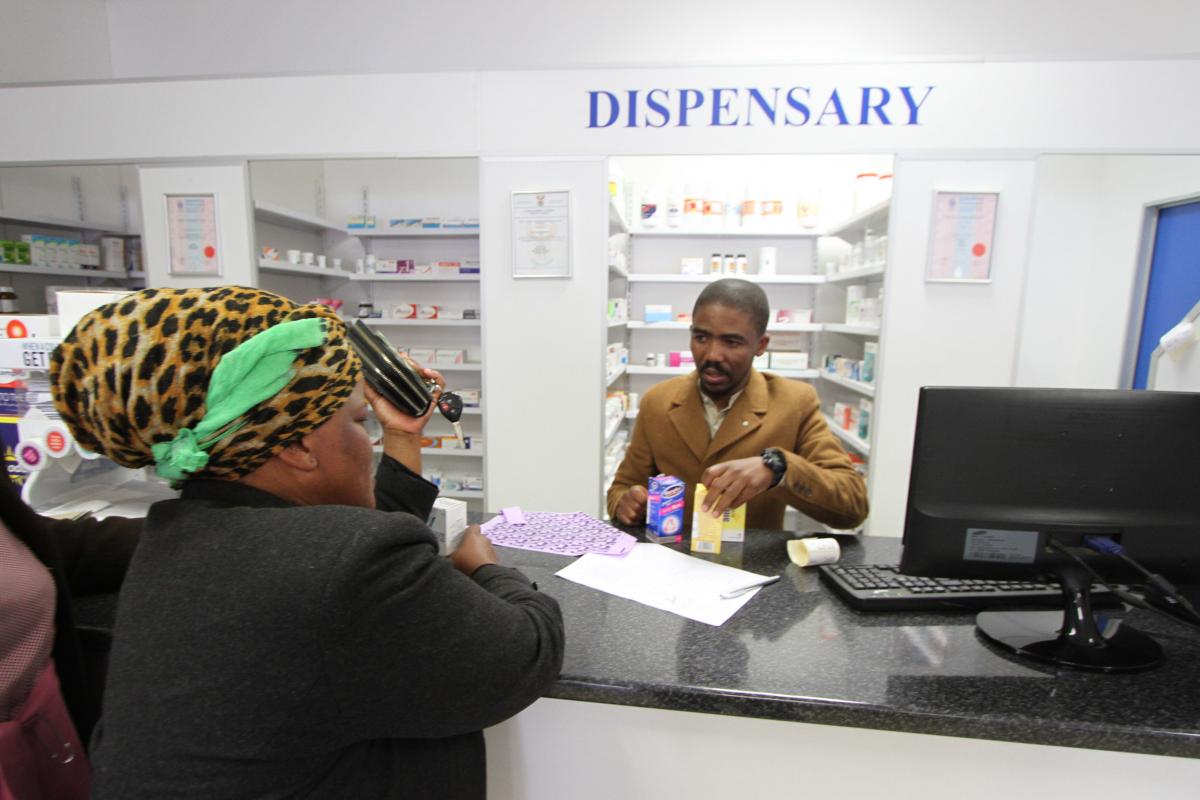
A young pharmacist made history by opening the first pharmacy in the small town of Mount Fletcher in the Eastern Cape in 2017. In doing so, he revolutionised healthcare for the small town’s many residents.
“I decided to take a risk and open in Mount Fletcher. I realised that there has never been a pharmacy in this town. I travelled across all the towns of [the former] Transkei and found Mount Fletcher as a suitable place to run the business,” said Mzinzi.
A graduate of the University of Western Cape, Vumile Mzinzi said that while small, the town is densely populated and services a number of rural villages. He explained that previously, residents had to cough up R70 for taxi fare to travel to and from Maclear – the nearest town, which is 62km away – to access pharmaceutical services.
Prior to the opening of Ithalomso Pharmacy, pharmaceutical services in Mount Fletcher were only available at the local Taylor Bequest Hospital, and these were strictly for patients.
Mzinzi graduated in 2010 and had been working as a pharmacist at Nelson Mandela Central Hospital in Mthatha before ’his life-changing decision’ to open his own business in Mount Fletcher.
He said opening the pharmacy required a lot of research and consultation to ensure that it would be viable. He chose Mount Fletcher because there was no pharmacy in close proximity and because he saw the area’s growth potential.
In investing in Mount Fletcher, the Ngcobo-born pharmacist created employment opportunities for eight residents from the surrounding villages.
The Eastern Cape Development Corporation (ECDC) helped finance and draw up his business plan which allowed him to successfully approach other financial institutions for funding.
ECDC head of risk capital Phakamisa George said the facility assists entrepreneurs
with the development of their business ideas up to a stage where they are able to meet the often stringent requirements of financiers.
“This support takes the form of facilitation, feasibility studies, development and testing of prototypes, regulatory compliance costs such as Environmental Impact Assessments, water licences and business plans,” George said.
Free healthcare through NHI
Free healthcare through NHI angenithaWith the National Health Insurance (NHI) in its final stages and soon heading to Parliament for submission, the Presidency has established a war room to address issues in the public health system.
The President made this announcement in his second State of the Nation Address, which is also the last of the fifth administration.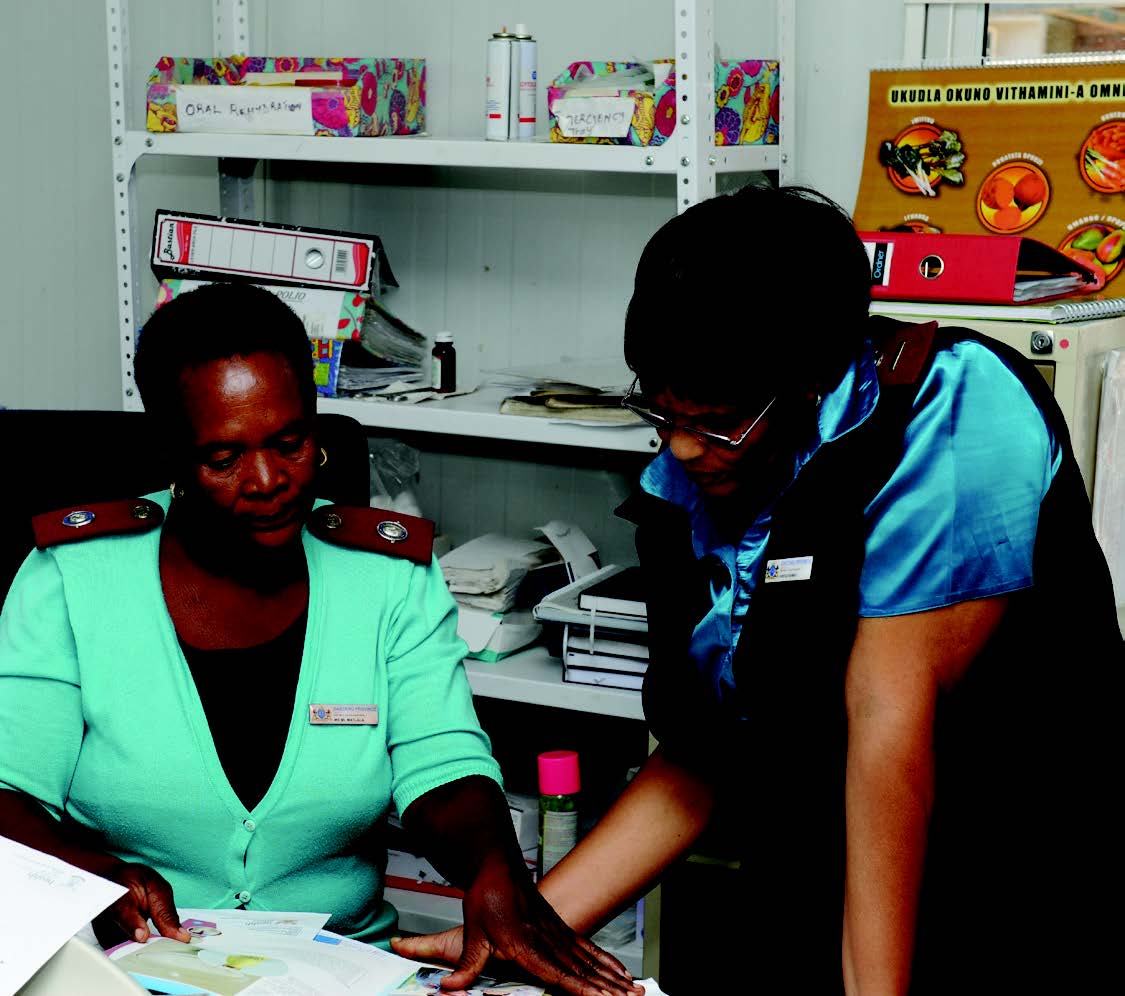
He said realising the magnitude of the challenges in healthcare, government has established an NHI and quality improvement war room in the Presidency consisting of various key departments to address the crisis in the public health system while preparing for the implementation of the NHI.
The NHI is a health financing system that is designed to pool funds to provide access to quality affordable personal health services and to ensure universal health coverage for all South Africans based on their health needs, irrespective of their socio-economic status.
“The NHI will enable South Africans to receive free services at the point of care in public and private quality-accredited health facilities. By applying the principle of social solidarity and cross-subsidisation, we aim to reduce inequality in access to healthcare,” said the President.
The initiative is being implemented in phases over a 14-year period, which started in 2012.
“By introducing the NHI together with a multi-pronged quality improvement programme for public health facilities, we are working towards a massive change in the healthcare experience of South Africans,” said the President.
In October last year, the Presidential Health Summit was convened bringing together key stakeholders from a wide range of constituencies in the health sector.
Issues highlighted at the summit are likely to feed into the much awaited NHI Bill.
“At this Health Summit, the participants dissected the crisis in the health system and proposed immediate, short-term and medium-term solutions to improve the effectiveness of the health system,” said the President. SAnews.gov.za
Growing SA’s economy for all
Growing SA’s economy for all LondekileState of the Nation Address
Government wants more South Africans to participate in the country’s economy.
Speaking during the State of the Nation Address, President Cyril Ramaphosa noted that the structure of South Africa’s economy was designed to keep assets in a few hands.
“This has stifled growth and enterprise and has to a large extent kept many young South African entrepreneurs and small enterprises out of the economy or confined them to the margins,” he added.
As part of efforts to increase investment, to promote greater inclusion and create more opportunities, the President said he would soon sign into law the Competition Amendment Bill.
“This will give the competition authorities the ability to address this problem but more importantly it will open up new opportunities for many South Africans to enter various sectors of the economy and compete on an equal footing,” he explained.
The President added that to stimulate growth in the economy, build more businesses and employ more people, there was a need to find new and larger markets for goods and services.
It is for this reason government will be focusing greater attention on expanding exports.
“In line with Jobs Summit commitments, we will focus on the export of manufactured goods and trade in services such as business process outsourcing and the remote delivery of medical services.
“We will also be looking at establishing special economic zones that are dedicated to producing specific types of products, such as clothing and textiles, for example,” said President Ramaphosa.
To improve the competitiveness of South African exports, government will complete the studies that have begun on reducing the costs of electricity, trade, communications, transport and other costs.
“The agreement on the establishment of the African Continental Free Trade Area offers great opportunities to place South Africa on a path of investment-led trade and to work with other African countries to develop their own industrial capacity.”
The agreement will see the creation of a market of over a billion people.
Alongside a focus on exports, government will also pursue measures to increase local demand through local goods and services procured both by government and the private sector.
Help for small businesses
Help for small businesses LondekileState of the Nation Address
Government will be giving entrepreneurs a boost which also opens a gap for job creation.
President Cyril Ramaphosa says government will this year focus on expanding the small business incubation programme.
The incubation programme provides budding entrepreneurs with physical space, infrastructure and shared services, access to specialised knowledge, market linkages, training in the use of new technologies and access to finance.
“The incubation programme currently consists of a network of 51 technology business incubators, 10 enterprise supplier development incubators and 14 rapid youth incubators. 
“As part of the expansion of this programme, township digital hubs will be established, initially in four provinces, with more to follow,” said the President when delivering his second State of the Nation Address, in Parliament recently.
The President said it was expected that the hubs will provide most-needed entrepreneurial services to small and medium enterprises in the rural areas and townships - but more especially to young people who want to start their own businesses.
The specific focus on the small business incubation programme was due to the role small businesses play in stimulating economic activity and employment and in advancing broad-based empowerment.
“Our greatest challenge is to create jobs for the unemployed of today, while preparing workers for the jobs of tomorrow,” he said.
Tax Incentive
“We have come up with great plans, platforms and initiatives through which we continue to draw young people in far greater numbers into productive economic activity through initiatives like the Employment Tax Incentive.
“This incentive will be extended for another 10 years,” said President Ramaphosa.
Government will also intensify the “buy South Africa” programme.
“..We will pursue measures to increase local demand through, among other things, increasing the proportion of local goods and services procured both by government and the private sector.”
He said increasing local demand and reducing the consumption of imports is important because it increases the opportunities for producers within South Africa to serve a growing market.
Jobs: Department of Justice and Constitutional Development - Feb 2019
Jobs: Department of Justice and Constitutional Development - Feb 2019 UrsulaChief Master
Reference: 19/10/MAS
Centre: National Office: Pretoria
Salary: R1 446 378 – R1 629 348 per annum (All inclusive remuneration package). The successful candidate will be required to sign a performance agreement.
Requirements: An appropriate LLB Degree or recognized 4 year legal qualification (NQF level 8); 8 years of experience at a senior management level of which 5 years should be in the Master’s environment; Knowledge of all spheres of law including interpretation of statutes, administrative law, law of contracts and asset forfeiture.
Enquiries: Mr. S Maeko Tel: (012) 315 1996
Deputy Director: Facilities Management: (Re-Advertisement)
Reference: 19/01/Kzn
Centre: Regional Office, Durban
Salary: R697 011 – R821 052 per annum (All inclusive remuneration package). The successful candidate will be required to sign a performance agreement.
Requirements: A Degree or 3 years National Diploma in Public Management / Administration or equivalent qualification; Minimum of 3 years’ experience in either Building Management / Maintenance or Project Management; Three (3) years practical experience in Facilities Planning and Management including space audit; Practical experience in managing external service providers; Knowledge and understanding of Fixed Asset Management, PFMA and GIAMA; Knowledge and understanding of Government procurement process relating to procurement of assets; A valid driver’s licence.
Enquiries: Mr J.N. Mdaka (031) 372 3000
Court Manager (3 Posts)
Reference: 19/02/KZN
Centre: Magistrate’s Office, Maphumulo
Reference: 2019/09/GP Note: The post is a re-advertisement; candidates who previously applied are encouraged to re-apply)
Centre: Magistrate Vanderbijlpark (1) & Magistrate Daveyton (1)
Salary: R444 693 – R523 818 per annum. The successful candidate will be required to sign a performance agreement.
Requirements: Three (3) year qualification in Administration (NQF level 6) and / or National Diploma in Services Management (NQF level 5) plus the module on Case Flow Management or equivalent qualification; At least 3 year’s managerial or supervisory experience; Knowledge of an experience in office and district administration; Knowledge of Public Financial Management Act (PFMA); Experience in managing Trust (Third Party Funds) and Vote Account; A valid driver’s licence; Experience in the Court environment will be an added advantage.
Enquiries: Kwazulu- Natal: Mr J.N. Mdaka (031) 372 3000
Enquiries: Gauteng: Ms RR Moabelo (011) 332 9000
Assistant Director: Finance
Reference: 2019/11/GP
Centre: Regional Office Gauteng
Salary: R356 289 – R430 389 per annum. The successful candidate will be required to sign a performance agreement.
Requirements: Degree or 3 year Diploma in Financial Management or equivalent qualification; Three years relevant financial experience; At least three years supervisory experience; Knowledge and understanding of the PFMA, Treasury Regulations and relevant Government regulations and policies; Knowledge and practical experience of the Basic Accounting System, Budgeting process in Government and Persal; Ability to work extended hours, when required; A valid driver’s licence.
Enquiries: Mr SF Ledwaba (011) 332 9077
Assistant Director Administration (Re-Advertisement)
Reference: 19/03/KZN
Centre: Office of The Family Advocate, Durban
Salary: R356 289 – R419 679 per annum. The successful candidate will be required to sign a performance agreement.
Requirements: B Degree/National Diploma in Public Administration or NQF Level 6 Equivalent; Three years supervisory and Administration experience; Knowledge and application of the Public Finance Management Act, National Treasury Regulations, Departmental Financial Instructions as well as Supply Chain Management; Knowledge and understanding of Public service Regulatory Framework as well as the Constitution of South Africa; Proven Track record of Program/ Project Coordination; Basic knowledge of the core functions of the office of the Family Advocate; A valid driver’s licence.
Enquiries: Mr J.N. Mdaka (031) 372 3000
Legal Administration Officer-(Mr 5)
Reference: 2019/12/GP
Centre: Regional Office Gauteng
Salary: R353 253 – R867 399 per annum. (Salary will be in accordance with OSD determination). The successful candidate will be required to sign a performance agreement.
Requirements: An LLB Degree; At least 8 years’ appropriate post qualification legal experience; Sound Knowledge of the South African Legal System; A valid driver’s licence.
Enquiries: Mr SF Ledwaba (011) 332 9000
Maintenance Officer (2 Posts)
Reference: 19/12/KZN, (Mr1- Mr5)
Centre: Magistrate Court: Pinetown:
Reference: 19/Va06/NW, (Mr1- Mr4)
Centre: Potchefstroom Magistrate Court
Salary: R186 828 – R475 773 per annum. (Salary will be in accordance with OSD determination). The successful candidate will be required to sign a performance agreement.
Requirements: An LLB Degree or recognized 4 year legal qualification. Knowledge of the maintenance system and family law matters. Knowledge of Maintenance Act (Act 99/1998); A valid drivers’s licence.
Enquiries: Kwazulu-Natal: Mr J.N. Mdaka (031) 372 3000
Enquiries: Mahikeng: Ms. L. Shoai at (018) 397 7054
Closing Date: 25 February 2019
Note: Interested applicants may visit the following website: www.justice.gov.za or www.dpsa.gov.za to view the full job specification of the above positions. Applications must be submitted on Form Z83, obtainable from any Public Service Department or on the internet at www.gov.za. A Z83 form & CV must be accompanied by original certified copies of qualifications, identity document and a driver’s license where necessary. A SAQA evaluation report must accompany foreign qualifications. Applications that do not comply with the above mentioned requirements will not be considered. All shortlisted candidates for SMS posts will be subjected to a technical and competency assessment. Candidate will complete a financial disclosure form and also be required to undergo a security clearance. Foreigners or dual citizenship holder must provide the Police Clearance certificate from country of origin. The DOJ&CD is an equal opportunity employer. In the filling of vacant posts the objectives of section 195 (1) (i) of the Constitution of South Africa, 1996 (Act No: 108 of 1996), the Employment Equity imperatives as defined by the Employment Equity Act, 1998 (Act No: 55 of 1998) and relevant Human Resources policies of the Department will be taken into consideration. Reasonable accommodation shall be applied for People with Disabilities including where driver’s license is a requirement. Correspondence will be limited to short-listed candidates only. If you do not hear from us within 3 months of this advertisement, please accept that your application has been unsuccessful. The department reserves the right not to fill these positions. Women and people with disabilities are encouraged to apply and preference will be given to the EE Target.
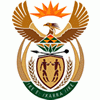
Jobs: Department of Labour - Feb 2019
Jobs: Department of Labour - Feb 2019 UrsulaDeputy Director: Management and Support Services
Centre: Provincial Office: Limpopo
Reference No: HR 4/4/6/24
Salary: All inclusive: R697 011 per annum
Enquiries: Ms. TE Maluleke, Tel: (015) 290 1662
Provincial Office Chief Director: Provincial Operations, Private Bag X 9368, Polokwane, 0700
Principal COID Employer Auditor
Centre: Provincial Office Kimberley
Reference No: HR 4/4/8/367
Salary: Commencing: R444 693 per annum
Enquiries: Mr. IS Vass, Tel: (053) 8381652
Provincial Office Chief Director: Provincial Operations: Private Bag X 5012, Kimberley, 8301
Assistant Director: Public Employment Services
Centre: Provincial Office: East London
Reference No: HR 4/4/1/170(1 post)
Salary: Commencing: R444 693 per annum
Enquiries: Ms. KD Mogotloane, Tel: (043) 701 3074
Provincial Office Chief Director: Provincial Operations, Private Bag X 9005, East London, 5200
Assistant Director: COID
Centre: Labour Centre: Modimolle
Reference No: HR 4/4/6/37
Salary: Commencing: R444 693 per annum
Enquiries: Mr. J Mokobodi, Tel: (015) 290 1665
Provincial Office Chief Director: Provincial Operations, Private Bag X 9368, Polokwane, 0700
Assistant Director: Fleet Management Services
Centre: Provincial Office: Limpopo
Reference No: HR 4/4/6/29
Salary: Commencing: R 356 289 per annum
Enquiries: Ms. TE Maluleke, Tel: (015) 290 1662
Provincial Office Chief Director: Provincial Operations, Private Bag X 9368, Polokwane, 0700
Assistant Director: Human Resources Operations and Employment Relations
Centre: Provincial Office: Gauteng
Reference No: HR 4/4/4/01/04
Salary: Commencing: R 356 289 per annum
Enquiries: Ms. MH Rampou, Tel: (011) 853 0300
Provincial Office Chief Director: Provincial Operations: PO Box 4560, Johannesburg, 2001
Assistant Director: Fleet Management Services
Centre: Provincial Office: Limpopo
Reference No: HR 4/4/6/29
Salary: Commencing: R 356 289 per annum
Enquiries: Ms. TE Maluleke, Tel: (015) 290 1662
Provincial Office Chief Director: Provincial Operations, Private Bag X 9368, Polokwane, 0700
ERRATUM: Kindly take note the post of Chief Director: Provincial Operations advertised on 1 February 2019 edition of Vukuzenzele for Provincial Office: Eastern Cape, Reference No: HR 4/19/02/12HO has been withdrawn.
Enquiries: Ms. M Bronkhorst, Tel: (012) 309 4969
Closing date for applications: 04 March 2019 | For full details of the advertised posts visit our website: www.labour.gov.za
Applications must be submitted on form Z83, obtainable from any Public Service Department or on the internet at www.gov.za/documents. The fully completed and signed form
Z83 should be accompanied by a recently updated, comprehensive CV as well as recently certified copies of all qualification(s) including a Senior Certificate and ID-document
[Driver’s license where applicable]. Non-RSA Citizens/Permanent Resident Permit Holders must attach a copy of their Permanent Residence Permits to their applications. Should you be in possession of a foreign qualification, it must be accompanied by an evaluation certificate from the South African Qualification Authority (SAQA). Applicants who do not comply with the above-mentioned requirements, as well as applications received late, will not be considered. The Department does not accept applications via fax or email.
Failure to submit all the requested documents will result in the application not being considered. Correspondence will be limited to short-listed candidates only. If you have not been contacted within eight (8) weeks after the closing date of this advertisement, please accept that your application was unsuccessful. Suitable candidates will be subjected to a personnel suitability check (criminal record, citizenship, credit record checks, qualification verification and employment verification). Where applicable, candidates will be subjected to a skills/knowledge test. All shortlisted candidates for SMS posts will be subjected to a technical competency exercise that intends to test relevant technical elements of the job, the logistics of which be communicated by the Department. Following the interview and technical exercise, the selection panel will recommend candidates to attend generic managerial competencies using the mandated DPSA SMS competency assessment tools. Successful candidates will be appointed on a probation period of 12 months. The Department reserves the right not to make any appointment(s) to the above post. The successful candidate will be expected to sign a performance agreement. The
Department of Labour is an equal opportunity affirmative action employer. The employment decision shall be informed by the Employment Equity Plan of the Department. It is the Department’s intention to promote equity (race, gender and disability) through the filling of this post(s) with a candidate whose transfer / promotion / appointment will promote representativity in line with the numerical targets as contained in our Employment Equity Plan.
Stay in touch with the department, visit: website: www.labour.gov.za | Facebook: Department of Labour | twitter: @deptoflabour

Milking the land through a partnership
Milking the land through a partnership LondekileState of the Nation Address
A dairy farming partnership between land claimants of Amamfengu and white farmers in Tsitsikamma in the Eastern Cape has resulted in a skills transfer programme.
The Wittekleibosch Dairy Farm was the first farm to be returned to black people in 1994 when the Amamfengu people successfully won a court bid for the return of their land. The group had been forcibly removed in 1977.
Upon return of the land existing dairy farmer Johan Du Plessis partnered with the land owners. The partnership would see the dairy farmers transfer skills to the land owners and also contribute cows and equipment to the partnership.
The representative of the land owners, Zilindile Blouw, said the partnership began in 2002 and is now selling milk to Parmalat.
“During peak season, we produce around 18 000 litres of milk,” Blouw told Vuk’uzenzele. He said the partnership had enabled the land owners to start their own dairy farm.
The farm makes between R33 and R36 million annually, said Du Plessis. “In the past 12 months, we made a good profit,” he added.
The partnership not only shares in the profits of the farm but it also has a share scheme on the cows produced.
“Every year we have stocktaking. If, for example, the farmer initially brought in 600 cows and we brought in 350, at the end of the period, each party takes their initial number of cows back, and the remaining cows – produced in that year - are divided equally between each party,” said Blouw.
The joint venture farming project was boosted when the Eastern Cape’s Department of Rural Development and Agrarian Reform invested R32 million. The department built a rotary dairy parlour for the farm which Du Plessis compares with moving from “a bicycle to a Mercedes” because of its state-of-the-art facilities.
The farm services 152 families from four villages. According to Blouw, several of the villagers are receiving training on how to be dairy farmers.
“We identified people who are interested in farming and they are receiving training,” he said, adding that Du Plessis is their mentor and provides guidance when it comes to their own farm too.
Mom thanks KZN health for miracle baby
Mom thanks KZN health for miracle baby angenithaAfter suffering four miscarriages and losing a prematurely-born baby at seven months, Durban mother Thembisile Mabaso had just about lost all hope of having a second child.
With help and support from staff at several KwaZulu-Natal hospitals, this 43 year-old resident of Woodlands is the proud mother of a cheerful two year-old baby boy, who was born at Inkosi Albert Luthuli Central Hospital (IALCH).
With February being Reproductive Health Month – Mabaso shared her journey of trauma, hopelessness and becoming a mother against all odds, thanks to the KwaZulu-Natal Department of Health.
Despite undergoing different types of fertility treatments, several miscarraiges and burying her six-month-old prematurely born baby in 2014, Mabaso never lost hope.
In 2016, she soon found herself pregnant again. This time, however, she sought the help of the public health sector. 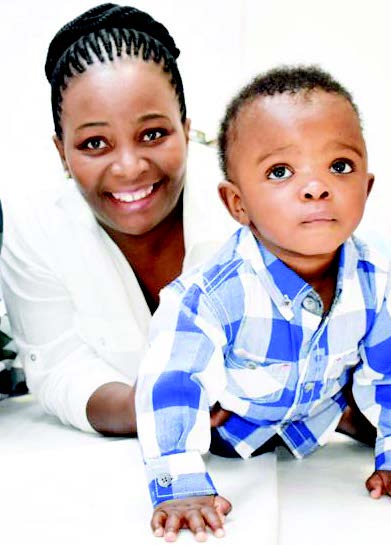
“At the clinic close to my area, I was tested to confirm my pregnancy and then asked about my medical history. Thereafter, I was educated about pregnancy, including the foods I should eat. This was my seventh pregnancy but it was the very first time that I got educated about pregnancy.”
She was referred to Wentworth and later King Edward hospital. The two hospital found her case to be complex and Mabaso was sent to IALCH hospital where she met with specialist Professor Motshedisi Sebitloane, who is also the University of KwaZulu-Natal’s Head of Obstetrics and Gynaecology Department.
“Doctors found that I had a shorter cervix, and then told me to use a certain pill – Cyclogest – and take it every night. They told me that it would help ‘hold’ the baby so that I would have a successful birth.”
“I was blown away by the love and support that I received from healthcare professionals of the Department. They told me I would leave the hospital with a baby in my hands – and indeed it happened.”
Mabaso remains concerned about the stigma and lack of support, at community level, faced by women with infertility problems and those who miscarry. She says attitudes must change.
She urged women struggling to conceive not to lose hope and seek the necessary healthcare.
New directorate to tackle corruption
New directorate to tackle corruption angenithaPRESIDENT CYRIL RAMAPHOSA has vowed to get even tougher on corruption and to recover assets that have been illegally acquired.
An investigative directorate – tasked specifically with probing corruption and associated offences – is on the cards for the National Prosecuting Authority (NPA).
President Cyril Ramaphosa made this announcement during his second State of the Nation Address.
The President noted that efforts to end poverty, unemployment and inequality will achieve little unless government tackles state capture and corruption in all its forms and in all areas of public life.
“The action we take now to end corruption and hold those responsible to account will determine the pace and trajectory of the radical social and economic transformation we seek,” he said.
The President explained that the idea of the directorate was borne from the issues emerging from the Zondo Commission of Inquiry into State Capture and other commissions.
He described the submissions made at the commissions as “deeply disturbing”, adding that they “reveal a breadth and depth of criminal wrongdoing that challenges the very foundation of our democratic state”.
Taking a firm stance, President Ramaphosa said beyond the commissions, evidence of criminal activity must be tried in the courts.
“While these commissions will in time make findings and recommendations in line with their mandates, evidence of criminal activity that emerges must be evaluated by the criminal justice system.
“Where there is a basis to prosecute, prosecutions must follow swiftly and stolen public funds must be recovered urgently,” he said.
The President also commended the commissions for the work they are doing, often under challenging circumstances, to uncover the truth.
President Ramaphosa said he and new National Director of Public Prosecutions Shamila Batohi, who took over the reins at the NPA on 1 February, have agreed that there is an urgent need to establish the directorate, in accordance with Section 7 of the NPA Act.
“I will soon be promulgating a proclamation that will set out the specific terms of reference of the directorate,” said the President.
In broad terms, the directorate will focus on the evidence that has emerged from the Zondo Commission, other commissions and disciplinary inquiries.
“It will identify priority cases to investigate and prosecute and will recover assets identified to be the proceeds of corruption,” he added.
New drive to deliver housing
New drive to deliver housing angenithaThe Human Development Agency is expected to build about 500 000 houses in the next five years as a way of responding to the country’s human settlement issue.
Government is stepping up efforts to ensure that it provides housing to people in well-located areas, where they have access to both economic opportunities and the services they need.
Delivering the 2019 State of the Nation Address in Parliament, President Cyril Ramaphosa announced the establishment of the Human Settlements Development Bank as the country seeks to accelerate the delivery of housing.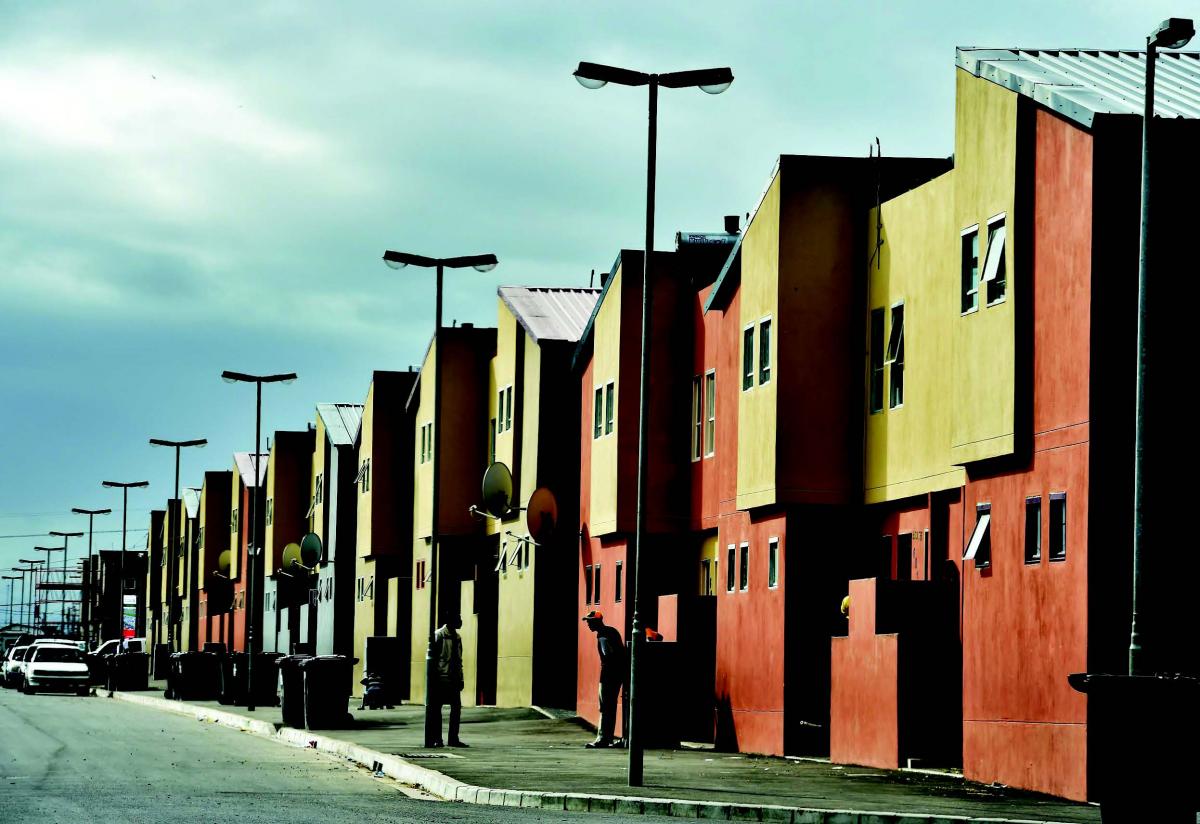
He noted that if the South African government is to effectively address the substantial housing backlog, models of financing human settlements needed to be developed.
The President explained that the Human Settlements Development Bank will leverage both public and private sector financing to aid in housing delivery.
“We will also be expanding the People’s Housing Programme, where households are allocated serviced stands to build their own houses, either individually or through community-led housing cooperatives,” he said.
President Ramaphosa said the Human Development Agency would, in the next five years, construct an additional 500 000 housing units.
“A further R30 billion will be provided to municipalities and provinces to enable them to fulfil their respective mandates,” he said.
President Ramaphosa added that government’s policy and legislative interventions will ensure that more land is made available for agriculture, industrial development and human settlements.
“Strategically located land will be released to address human settlements need in urban and peri-urban areas,” he said.
During the 2017/18 financial year, the Housing Development Agency delivered 2 358 housing units in the Johannesburg, Tshwane and Ekurhuleni metros. About 3 440 sites and services completed from the projects funded by the Urban Settlement Development Grant and 1 637 beneficiaries were approved.
In addition, 6 907 172 hectares of land has been acquired for the Gauteng Department of Human Settlements in the City of Ekurhuleni.
- SAnews.gov.za
Puppeteer pulls the strings of community art
Puppeteer pulls the strings of community art UrsulaThe Free State's Pesa Pheko has performed on many local and international stages. He is now determined to give back to his community.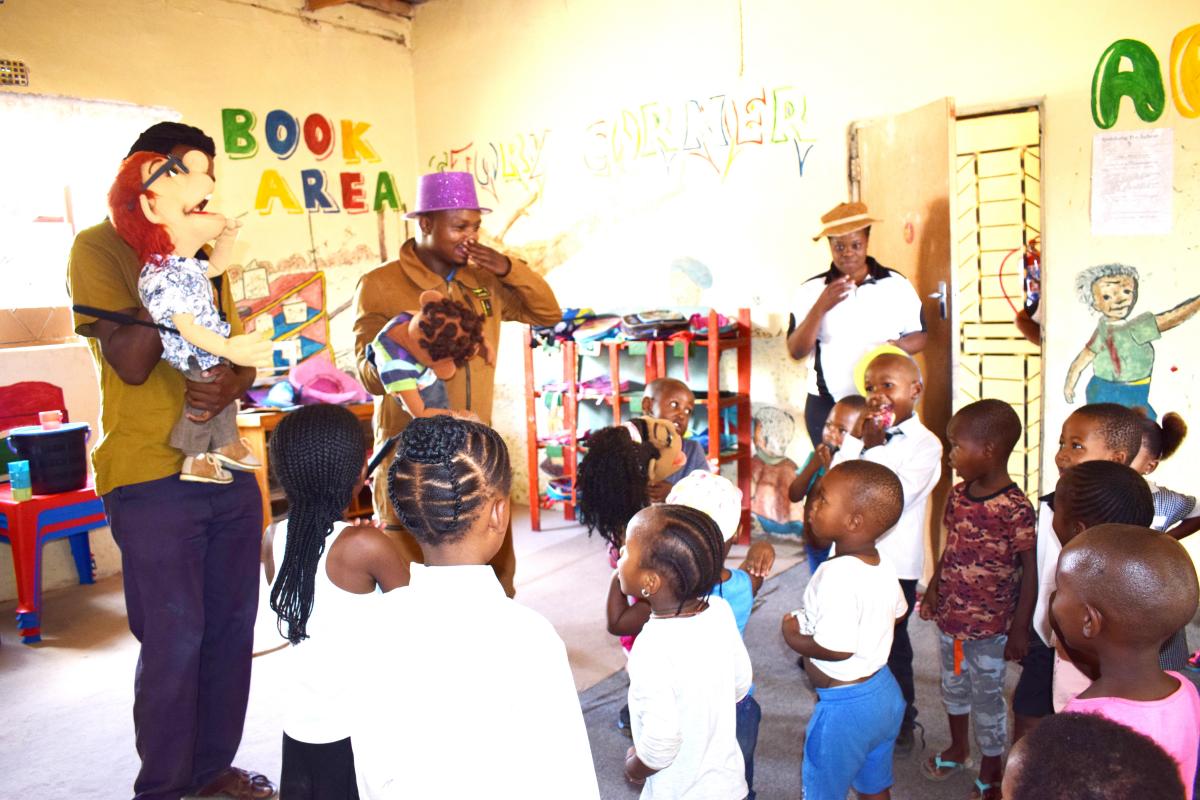
Cultural activist and puppeteer Pesa Pheko is getting the children in his home town of Botshabelo to dance to their own tune.
Pheko is committed to fostering community art development through his Botshabelo Arts, Culture and Heritage (Bach) Centre and Legacy Kiddies Village, which teaches children as young as three the art of puppetry, oral storytelling, dance, music and drama.
He is currently working with 30 early childhood development centres and four schools in Botshabelo and interest has been shown in his work by people in nearby Marquard and even from Lesotho.
Situated in a high crime and gang-ridden area, the Bach Centre hosts a Thursday Story Tellers programme to enable community members to come together and tell their life stories, which helps with the healing and upliftment of the participants. The centre also works with former gangsters and offenders and has trained 58 puppeteers and 25 puppet directors across the Free State. Soon, Pheko hopes to open a ‘shack theatre’ in Botshabelo.
While Pheko has received some funding from the National Lotteries Commission, most of his work is self-funded.
Pheko was introduced to the arts about 17 years ago when he auditioned for Sarafina while in high school and impressed the judges. He went on to perform in shows such as The Lion King, Phantom of the Opera and Moshoeshoe.
His formal education was limited but he believes real-life experiences have provided valuable lessons.
His love of dolls started while working as one of the production managers and screenwriters for the 2010 FIFA World Cup opening and closing ceremonies. He was part of the team behind the championship mascot Zakumi.
“When I was young, community drama competitions were common, but now gangsterism and alcohol abuse dominate the lives of young people. I’m tapping into this space to say, we need to change this.”
Pheko hopes that the centre will go mainstream and offer arts and culture qualifications and groom educators in the creative arts industry.
Pheko said working with children has helped him redefine his journey as an artist and human being.
“Kids are the most honest audience you can find.”
Putting a stop to women and child abuse
Putting a stop to women and child abuse angenithaGovernment wants to put an end to the scourge of women and chlid abuse.
President Cyril Ramaphosa has announced bold steps to intensify the fight against gender-based violence. 
The president used his second State of the Nation Address to unpack coordinated interventions including increasing financial backing to initiatives that support survivors of gender-based violence.
"We are expanding and dedicating more funds to places of support, such as the Thuthuzela Care Centres and Khuseleka Care Centres. We have been working to ensure the better functioning of Sexual Offences Courts," the President said.
Government, he said, will this year lead the campaign to include men and boys as active champions in the struggle against gender-based violence.
"Ending gender-based violence is an urgent national priority that requires the mobilisation of all South Africans and the involvement of all institutions. South Africa has extremely high levels of substance abuse, which feeds crime and violence against women and children. It deepens poverty and causes great hardship and pain for families.”
Over the past year, government has begun to address the scourge in a more serious and coordinated way.
“We are strengthening the functioning of various specialised units such as the Family Violence, Child Protection and Sexual Offences Units and improving our administrative and record keeping capacity at all levels,” President Ramaphosa said.
In October last year, the President hosted the Gender-based Violence and Femicide Summit, where women from all walks of life came together with government and civil society to outline a road map to end gender-based violence, improve the coordination of planning, and establish a commitment to resourcing and accountability.
“Work is underway to implement the decisions of the Summit, including preparing the National Strategic Plan on Gender- Based Violence,” President Ramaphosa said.
Government will improve the quality of services in shelters and ensure they also accommodate members of the LGBTQI+ community.
“We will strengthen the national hotline centre that supports women who experience gender-based violence and ensure it is functional. We have listened to the call to make funds available to combat gender-based violence, and have allocated funding in the current budget to support the decisions taken at
the Summit,” the President said.
Do you need help?
If you are victim of abuse and need counselling and support call the Gender-Based Violence Command Centre toll-free number on: 0800 428 428. Callers can also request a social worker from the command centre to contact them by dialling *120*7867# (free) from any cell phone.
SONA 2019 Red carpet
SONA 2019 Red carpet Joy|
|
SONA 2019
Dressed to the nines, Members of
|
|
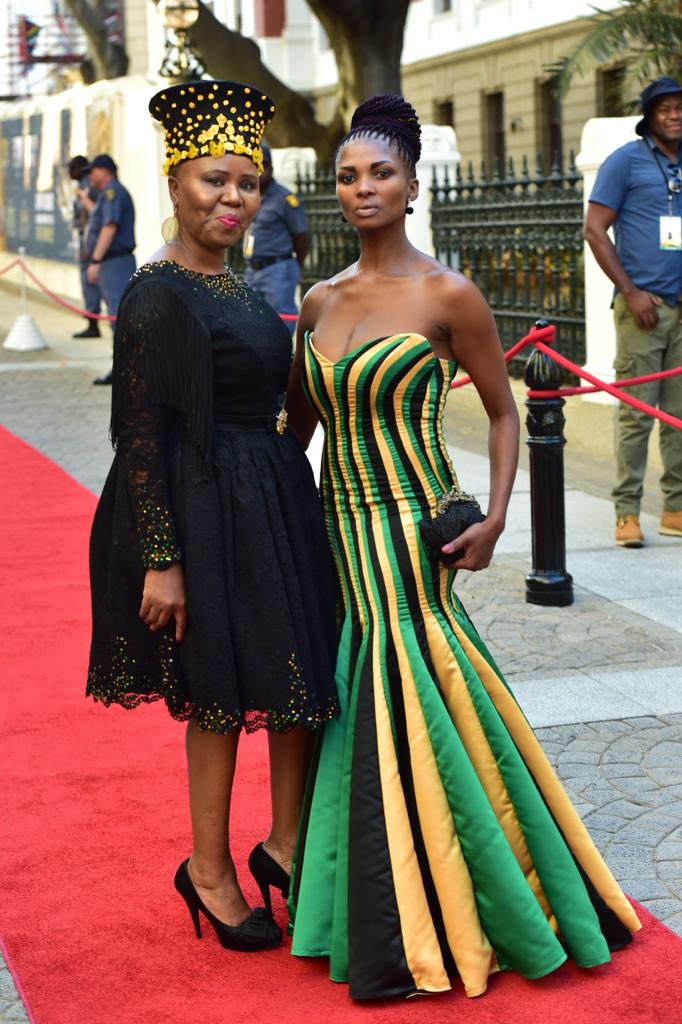 |
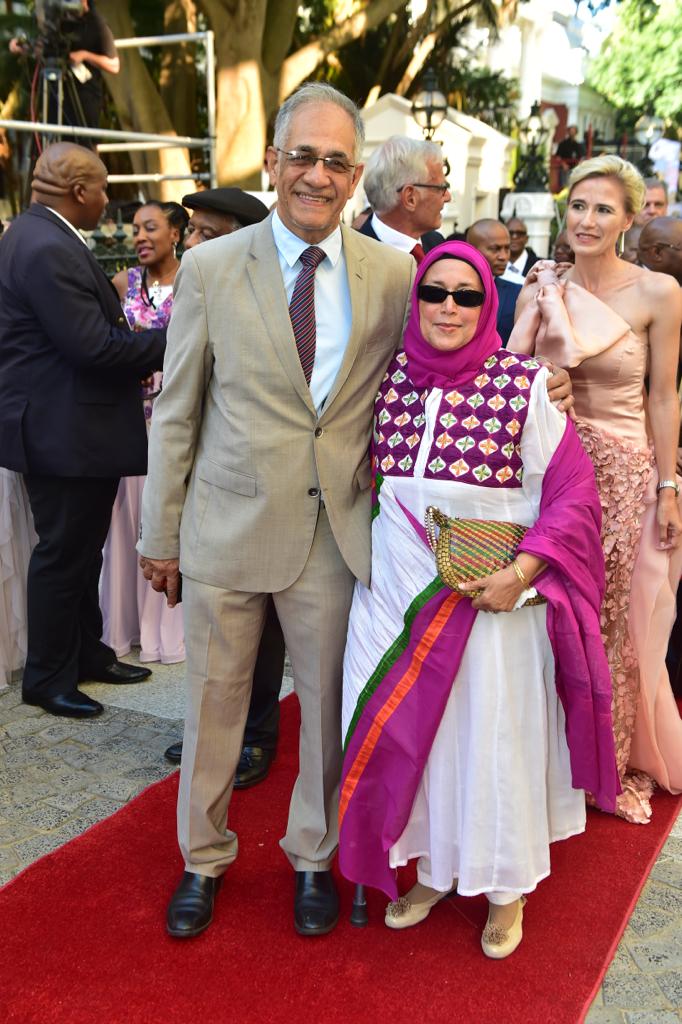 |
|
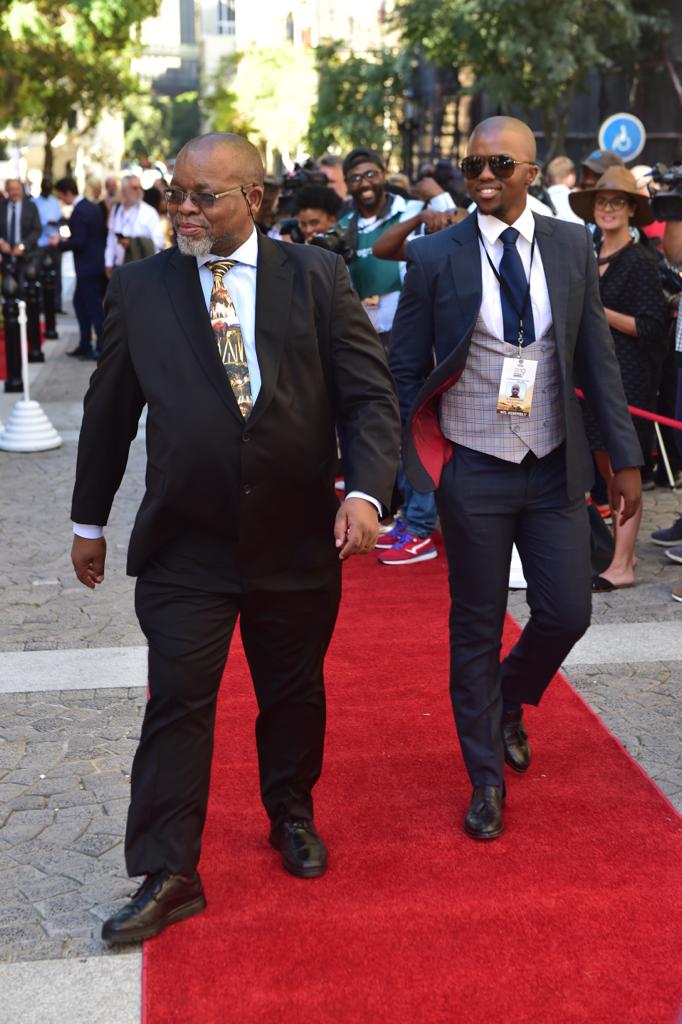 |
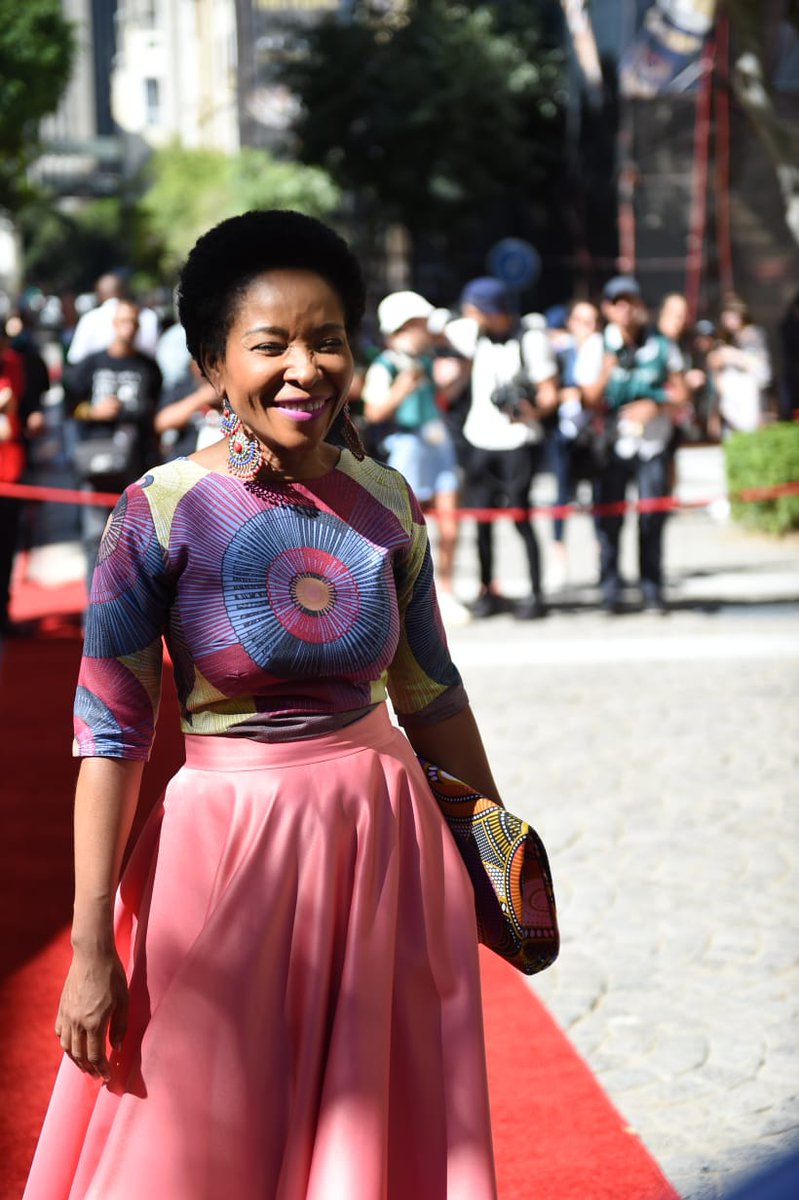 |
SONA in numbers
SONA in numbers JoyGrapple. Strengthen. Plan. These words best define the essence of President Cyril Ramaphosa’s State of the Nation Address, which laid out strategies for tackling current challenges, for deepening the gains already made on many fronts and for plotting the nation’s course forward.
As the President spoke about the state of the nation, a number of interesting figures emerged:
Investment and job creation
10 – The number of industrial parks in rural or township areas that have been revitalised, with another six to follow.
R1.2 trillion – Government’s five-year investment target.
R300 billion – The sum of investment pledges made at the inaugural South Africa Investment Conference.
R70 billion – The inflow of foreign direct investment in the first three quarters of 2018, compared with the
R17 billion in 2017.
R187 billion – The value of projects being implemented following the investment conference held in 2018.
$3.3 trillion – The combined GDP of the African Continental Free Trade Area.
275 000 – The number of additional direct jobs government’s Presidential Jobs Summit social partners aim to create every year.
250 000 – The number of small emerging farmers who are working the land and need government support to grow.
Small business incubation programme
51 – The number of technology business incubators.
10 – The number of enterprise supplier development incubators.
14 – The number of rapid youth incubators.
Operation Phakisaís Oceans Economy
R30 billion – The sum of investments secured since 2014.
7 000 – Direct jobs created.
R3.8 billion – The expected investment in the sector over the next five years by government. The private sector is expected to invest another R65 billion.
100 000 – The number of direct jobs to be created through Oceans Economy investments. Another 250 000 indirect jobs will be created.
Infrastructure development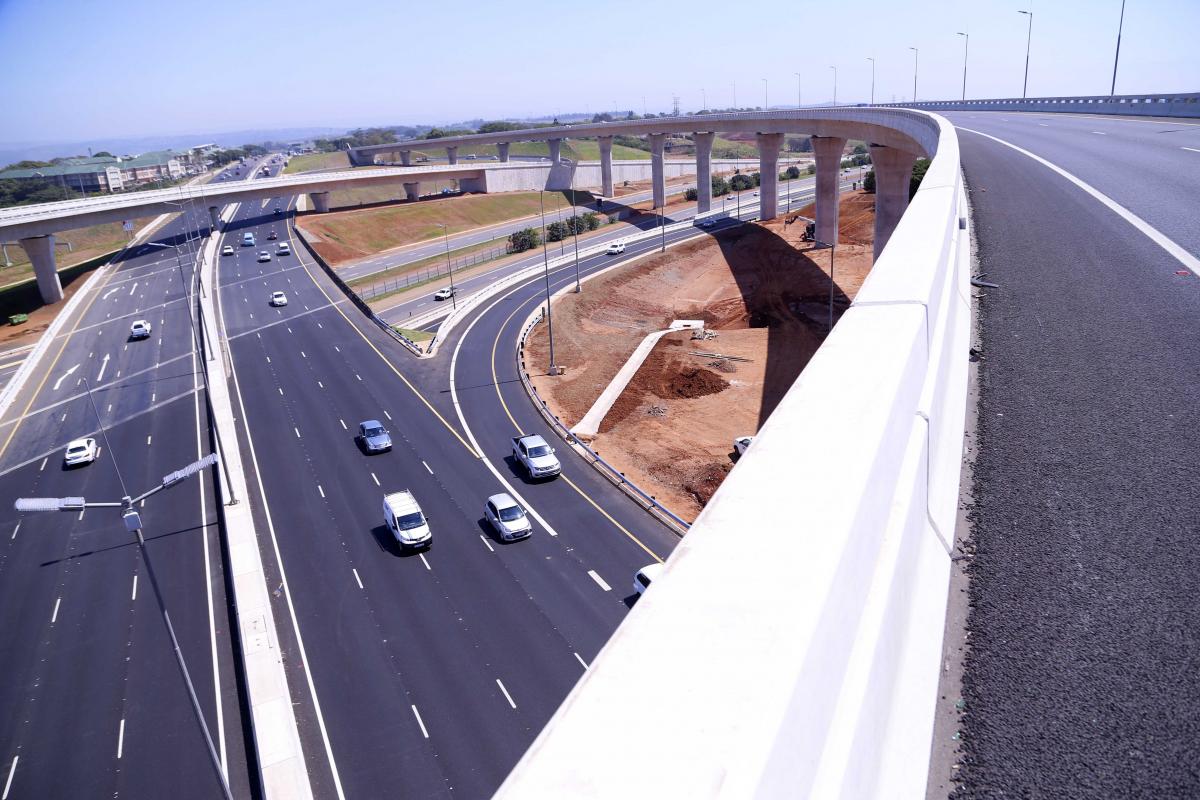
More than R1.3 trillion – The amount spent building schools, two new universities, thousands of new houses and electrifying more than a million homes.
R100 billion – The amount government intends investing in the new Infrastructure Fund over a 10-year period.
Housing
500 000 – The number of additional housing units the Housing Development Agency will construct in the next five years.
R30 billion – The amount that will be provided to municipalities and provinces to enable them to fulfil their respective mandates.
Social grants
17.5 million – The number of monthly social grants paid.
Local municipalities
57 – The number of municipalities that have been supported and stabilised.
10 000 – The number of municipal infrastructure projects being implemented.
Welcome to SA!
10 million – Tourists visited South Africa in the past year.
21 million – The target for international tourists by 2030.
2 million – The number of jobs that the sector can create in food and agriculture, construction, transport, retail, and the creative and cultural industries by 2030.
Educating the nation
Nearly 4 000 – The number of schools without appropriate sanitation facilities.
699 – The number of schools provided with safe and appropriate sanitation facilities.
1 150 – The number of schools in the planning, design or construction stages.
700 000 – The number of children accessing early childhood education in the past financial year.
6 – The number of years it will take to provide every school child with digital workbooks and textbooks on a tablet device.
90 – The percent of textbooks in high enrolment subjects across all grades that have been digitised.
Smart school produces smart learners
Smart school produces smart learners LondekileState of the Nation Address
Using Information Communication Technology (ICT) to educate learners boosts their morale and prepares them to stay current and relevant to the needs of the global economy.
This is according to Mathibedi wa-Medupe, the deputy principal for further education and training at Seshegong Secondary School in Olievenhoutbosch, Centurion.
The state-of-the-art school was launched in 2018 by the Gauteng Department of Education to help ease learner influx pressure and replaced the original school building, which was situated nearby.
It is the only high school among the three in Olievenhoutbosch that is information technology-based.
Medupe spoke to Vuk’uzenzele about the benefits that technology has brought to the school.
Among other things, Medupe said when learners are afforded an opportunity to use world-class technology to learn, it eases the pain of their socio-economic status.
He said the use of ICT in schools is also relevant to the Fourth Industrial Revolution which is also known as 4-IR. The revolution will bring Cyber-Physical Systems (CPS) where computers, networks and physical processes are integrated.
“The use of ICT helps our learners to not consider themselves as poor due to their family backgrounds. It also lays a foundation for them to be ready when they finish high school because they will be expected to use technology at university level and thereafter,” he explained.
In terms of education benefits, Medupe said ICT enhances teaching and learning in general.
“It assists teachers to prepare better for their classes,” he said, explaining that since their move to their new school, subject delivery has improved. “It also improved the turnaround time of learners’ assessments. The presentation of the research tasks has also improved.
“Today’s generation is very interested in new technology and gadgets. Using smartboards and tablets enhances their interest in education,” he added.
The school obtained a 93.3 percent pass rate in 2018 and was recognised as a top-performing no-fee school in Tshwane South District as well as the no-fee school with the highest percentage of bachelor passes in the district for 2018.
Although the school was built to accommodate 1 200 learners, there are currently 1 542 learners registered. It has 45 academic staff members, including the principal and her two deputies.
Squeaky clean success for Mthatha entrepreneur
Squeaky clean success for Mthatha entrepreneur UrsulaAmina Chem is an example of how good marketing and support from government can give birth to brilliant business success.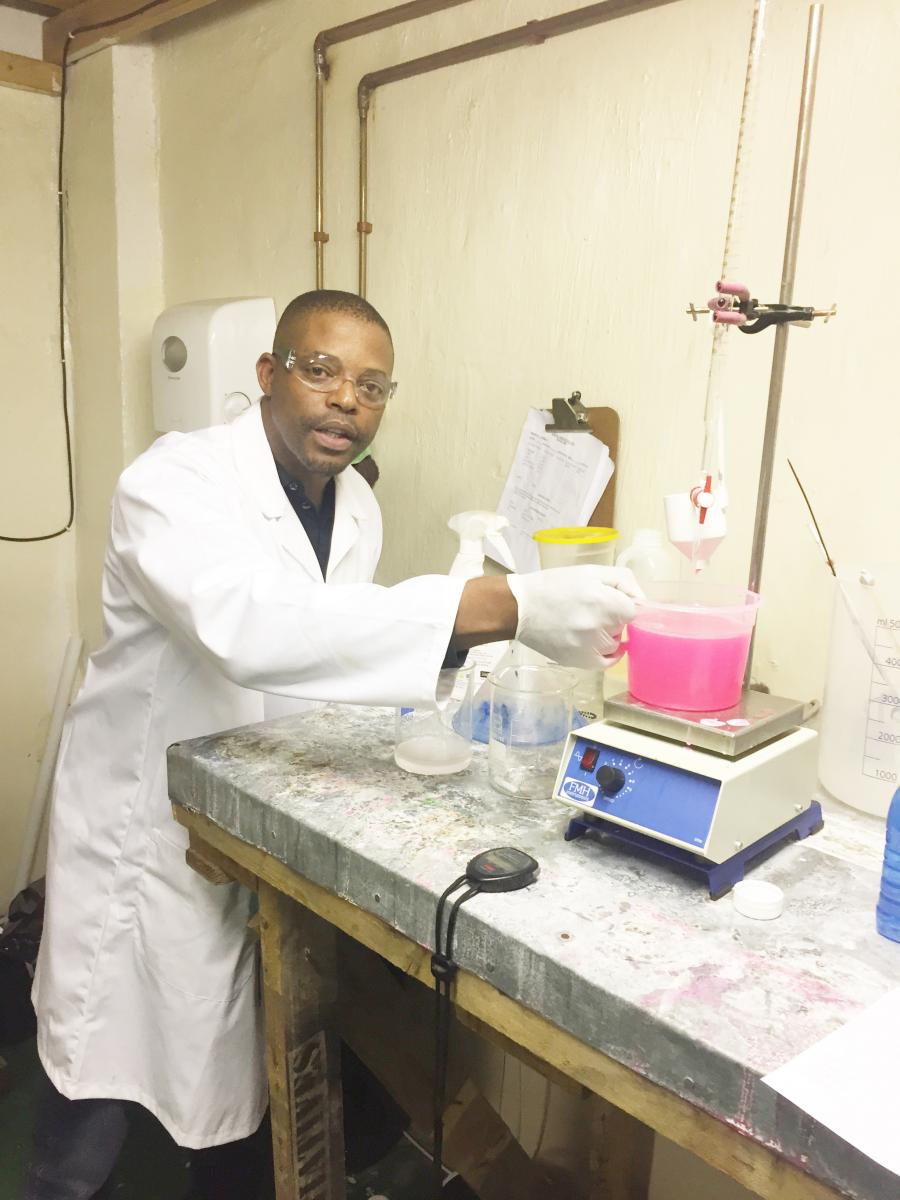
Growing and nurturing a business is what cleaning company founder Siviwe Mnyaka is all about.
He decided to leave the corporate life of marketing and founded Amina Chem in 2012.
The company produces, markets and distributes cleaning products.
The Mthatha-based business produces about nine tons a day of a range of different cleaning products which are used for laundry, automotive, bathroom and kitchen cleaning products. This company has a variety of 60 different cleaning materials.
“We specialise in the manufacturing and marketing of quality cleaning detergents and equipment for both industrial and domestic cleaning and maintenance,” said Mnyaka.
He added that Amina Chem has grown over the years with its turnover being more than a R1 million.
He added that in the inception stages of the company he only had two employees but this has grown to 17 people.
Amina Chem’s success can also be attributed to the support it received from the Eastern Cape Department of Economic Development Environmental Affairs and Tourism (DEDEAT).
The company received a boost of R1.5 million for equipment. Along with R600 000 from the Small Enterprise Development Agency (Seda) which also was ploughed into purchasing equipment.
“Since 2012 we have grown from manufacturing products by hand in 200 litre drums to semi-automated stainless steel tanks. Our growth has been organic as it has been purely led by customer base growth and new product development.”
The growth led us to move from a 150 square meter factory flat to a 483 square meter factory.
Currently Amina Chem has a client base of over 200 regular customers and supplies clients including several hospitals, Walter Sisulu University as well as funeral parlours, car wash businesses and bus company AB350.
Mnyaka said the experience he received in the marketing industry helped him in growing his business to what it is today.
State land identified for redistribution
State land identified for redistribution LondekileState of the Nation Address
Government has identified land parcels owned by the state for redistribution in an effort to accelerate land reform.
“Strategically located land will be released to address human settlements needs in urban and peri-urban areas,” announced President Cyril Ramaphosa during his second State of the Nation Address.
He commended many South Africans who participated in the work of the Constitutional Review Committee on Expropriation of Land Without Compensation, in the dialogue that ensued through the length and the breadth of the country.

The National Assembly agreed last year to establish an ad hoc committee to initiate and introduce legislation before the end of the fifth Parliament to amend section 25 of the Constitution so that expropriation of land without compensation is made explicit, as a legitimate option for land reform.
President Ramaphosa applauded the members of the Constitutional Review Committee for remaining focused throughout this period.
He said an advisory panel of experts headed by Dr Vuyo Mahlathi has been established to advise government on its land reform programme.
This panel is expected to table its report by the end of March 2019.
Meanwhile, President Ramaphosa said that the potential of agriculture in South Africa for job creation and economic growth still remains largely underdeveloped.
“South Africa still has large areas of underutilised or unproductive land. There are around 250 000 small emerging farmers who are working the land and need support in fully developing their businesses,” President Ramaphosa said.
He maintained that agriculture exports are an important source of revenue for the economy.
“Our policy and legislative interventions will ensure that more land is made available for agriculture, industrial development and human settlements,” President Ramaphosa said.
Stimulus package in agriculture
As part of the stimulus package in agriculture, President Ramaphosa added that government has invested significantly in comprehensive farmer development support to ensure that restituted and communal land is productively utilised.
“We will continue to prioritise targeted skills development and capacity building programmes for smallholder and emerging black farmers. In the coming year, we will continue to focus on high value agricultural products with export potential such as our fruit, wine and vegetable industries,”said the President.
There’s a stylish new kid on the clothing block
There’s a stylish new kid on the clothing block LondekileA young designer with a passion for fashion has carved a place for herself in the relatively closed garment market.
After studying abroad for close to 10 years, Chaz Ngaka (36) started a clothing business in Johannesburg that has created hundreds of jobs.
Kala Lifestyle designs, manufactures and supplies fashion wear, corporate apparel and protective clothing. In its decade of existence, Kala has created 120 direct jobs and approximately 500 indirect jobs and has an annual turnover of about R5 million.
Ngaka was born in Pietermaritzburg but was fortunate to be able to study in America and London which, she says, opened her mind and inspired her to take brave decisions as a young black woman.
“After completing grade 12, I applied to a programme that sent youngsters to study in America. I later studied fashion design at London College. I also obtained an information technology qualification from Birkbeck University,” she explained.
While working for a retail chain store in London, Ngaka was headhunted by a local retail chain store and returned home in 2005 to work as a ladies’ range buyer.
“I realised during that period how closed the market was because the companies that manufactured and supplied clothes to many stores have been doing business with them for decades. There were no newbies in the game. I saw the gap and two years later I decided to establish my business,” she said.
In the beginning she had no factory and had to outsource the manufacturing of her designs, but today Ngaka has her own factory with the capacity to manufacture 60 000 units of a specific order.
“Getting a R2.5 million loan from the Industrial Development Corporation of South Africa (IDC) has helped my business grow.
“I also get a lot of support from the IDC in terms of marketing campaigns and being exposed to business opportunities,” she explained.
While Ngaka is a shining example for entrepreneurs, her success was not without its challenges. Her message to budding entrepreneurs is to be focused, patient and continue empower themselves with the skills needed to grow their businesses.
Woza Albert comes to the South African State Theatre
Woza Albert comes to the South African State Theatre UrsulaPerformers and storytellers bring internationally acclaimed stage play to the State Theatre. 
This March theatre lovers will feast their eyes on the internationally acclaimed play Woza Albert!
The stage play which features renowned actors Mbogeni Ngema and Percy Mtwa has travelled all over the world for about four decades.
At the height of apartheid, Ngema and Mtwa asked a question; what would happen if Christ returned to South Africa? They then developed a stage play, Woza Albert! with renowned theatre-maker and co-founder of the Market Theatre, Barney Simon.
The production, a celebrated example of hard-hitting political satire, toured the world during the late 1970s and 1980s, and played a major role in raising awareness and global support for the anti-apartheid struggle.
Woza Albert! explores how the second coming of Christ (Morena) would affect the lives of poor black people, and how the white apartheid authorities would react. The two actors, directed by Christopher John, present a compelling view of a multitude of black and white characters as they explore themes of race and class and expose the power structures of white supremacy.
The play concludes with a call for Christ (Morena) to raise the dead heroes and leaders who fought against apartheid.
“Even in the current democratic climate, the question that was asked by Ngema and Mtwa during the days of apartheid is still relevant. There is a lot going on in our maturing democracy which arguably makes those who died with a revolutionary sword turn in their rested graves,”said State Theatre CEO, Dr Sibongiseni Mkhize.
Woza Albert! will be on stage from 8 to 31 March at the State Theatre.
